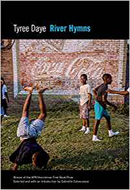 Tyree Daye
Tyree Daye
River Hymns
The American Poetry Review/Honickman First Book Prize 2017
Reviewer: Cindy Hochman
My mama would say
to kill a cricket
is a sin against the night.
—Tyree Daye, “Tamed”
There’s something about the work of Southern writers that sticks to the soul. Maybe it’s the sultry air, or the oppressive weather generating a feeling of confinement, especially in a poverty-ridden small town full of ghosts. Maybe it’s the ghosts of history and violence (“my mother says letting go means removing the dead that won’t play ghost”), or the traditions of Southern hospitality and fine home-cooking. Or the way that old-time religion and holy hymns so often live side by side with temptation and vice. Maybe it’s the wisdom of words that cry passion. Most likely, though, it’s the sense of place that immerses the dreamy reader in all of the above. Flannery O’Connor, one of the most beloved literary daughters of the South, opined that “Somewhere is better than anywhere,” and in her seminal work Wise Blood, one of her characters declares, “Where you came from is gone, where you thought you were going to never was there, and where you are is no good unless you can get away from it.” These sentiments epitomize the poems in Tyree Daye’s award-winning book River Hymns, in which a plainspoken and undisguised vernacular, poetic but often painful, is delivered in surprisingly gentle tones that soften the harsh circumstances from which the poet speaks. Daye’s river hymns are fluid streams of consciousness that tell whole stories; not always pretty, but as honest as the rivers themselves.
A List of Waters
My mama’s water
is all water, I’m every river rock
inside her being smoothed over.
…
Every woman
who has ever told me to clean my face
is the Atlantic Ocean.
…
I dream mostly in floods.
Tyree Daye’s voice is that of a young man who was born an old soul, and the reader can feel the great weight of elegiac encumbrance tussling with a wonderment that is intrinsic to his pensive and romantic nature. In the poem “Tongues,” Daye observes that “Death was never a child, always / had to think of others first. // Before we knew what our bodies were worth / we made wounds the way the sky made blue.” These lines seem no less than an attempt to stanch his bruises and turn them into poetry—and there are quite a few such nuances to be found in these poems. For instance, in the poem “Lord Here,” he is direct and succinct: “I learned what a bullet does to a back, to a mother”—one sentence with no further details necessary to convey this horrific reality, but Mama’s essence permeates the book and infuses her son with tenderness, a lull and a lullaby.
Story
men down here mixed blood with water
and called it wine.
Towards the Mouth of the River
I’m a doe in my mother’s house
the water covering my hind legs completely
I drink from the deep end
of her body
…
I turn back into a river when I leave
step onto the porch
flood the yard
water never forgets
it’s water
…
my body one big draining
one big body of brown water
The elements play a vital role in the poet’s topography. There are numerous references to ash, earth, and dirt, particularly pertaining to the viaduct between life and death (“Dirt is the only thing I know that can’t die” and “The ground made its own clay coffin”) and to fire, but it is of course water that is most salient here. In “Neuse River,” Daye recognizes that “Even the water // I was baptized in / isn’t safe,” as if there is an inherent risk in simply having been born and in what surrounds him. Similarly, the slow-flowing river that borders his home and gives him a sense of serenity is, at least metaphorically, connected to the gin that his uncles and grandfather succumbed to, and which threatens the poet too (“I threw up the river last night”). And it is this same Neuse River that the poet links with a tragic revelry in “Gin River” (“If the Neuse River was gin / we would’ve drunk to its bottom”). This legacy of water inhabits his mother’s body as well as his own; for Tyree Daye, the river becomes a way to keep his departed family members close to him, keep them safe. The river is also a mirror, a way in which the poet himself is reflected.
Wade Through
her mama told her if you see a hummingbird
yellow and blue wind
under a small head
someone’s going to die
someone always did
According to Daye family lore and superstition, birds bring death (think a murder of crows), but although there is no dearth of feathers flying through these poems, for a sensitive artist who is stifled by “this town / all dead and birdsong,” the symbolism of the avian spirit is not of imminent death, but of freedom and salvation, in the same way that poetry and imagination are. In “Southern Silence,” the poet says “I wish I only spoke / in song // made a home / from these trees / the way birds do” and in “Strike the Stone See if it’s Thinking of Water,” he recalls that “At seven I wanted to be a blue and red parrot // in an old jungle /tree.”
In this regard, Tyree Daye, a son of the South, has much in common with Harper Lee, another perceptive and yearning Southerner (obsessed with mockingbirds), who penned these sage words: “You never really understand a person until you consider things from his point of view … Until you climb into his skin and walk around in it.”
In River Hymns, the poet lets us walk around in his skin. And, despite some moments of despair, there is much cause to rejoice.

